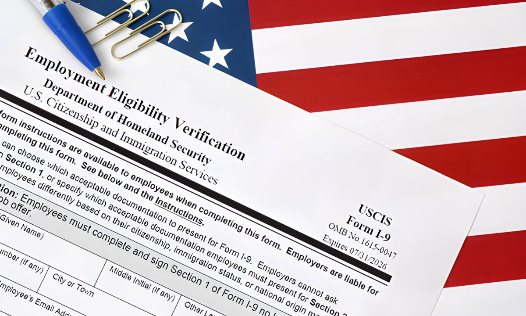Payment is being processed. Please do not refresh or close this page until your payment is complete.
 Book an Appointment
Book an Appointment

The essential US Form I-9 has updated its language, reverting from 'noncitizen' back to 'alien authorized to work.' While your work eligibility rules remain unchanged, this terminology shift is important to note when completing the form.
The U.S. Citizenship and Immigration Services (USCIS) has rolled out an updated version of Form I-9, bringing back the term “alien authorized to work” in place of “noncitizen authorized to work.” This marks a significant policy shift, especially for foreign workers and American employers hiring non-U.S. citizens.
What Is Form I-9?
Form I-9, officially known as the Employment Eligibility Verification Form, is a mandatory document for all U.S. employers. It is used to verify the identity and work authorization of every individual hired in the United States, whether they are US citizens or foreign nationals.
Both employers and employees must complete the form.
• Employees are required to submit acceptable documents proving their identity and legal authorization to work.
• Employers must inspect and record the details of these documents to confirm they are authentic and pertain to the individual hired.
Key Changes to the New Form I-9
Here’s what’s new in the revised Form I-9:
• Citizenship Status Wording: The fourth checkbox in Section 1 now reads “An alien authorized to work”, replacing the previous term “noncitizen authorized to work.”
• Updated Document Descriptions: Two List B documents (used to prove identity) have revised descriptions.
• Revised DHS Privacy Notice: The instructions now include updated language to align with federal legal standards.
These changes are designed to bring the form’s language in line with existing U.S. statutes, according to USCIS.
What Does “Alien” vs. “Noncitizen” Mean for You?
This terminology shift primarily impacts the form’s language. Here’s the breakdown for international workers:
1. A Change in Wording, Not Eligibility: It’s only a wording update on the form. Proving your identity and legal work authorization requirements haven’t changed; your eligibility is unaffected.
2. Awareness is Key: Be aware: Section 1 of the new Form I-9 uses “An alien authorized to work.” Select this checkbox if it matches your status.
3. Perception vs. Legality: “Alien” aligns Form I-9 with legal statutes, though some find the term impersonal. The actual verification process and requirements remain the same.
Impact on Noncitizens
The updated terminology could raise eyebrows among immigrants. The Biden administration had previously replaced the word “alien” with “noncitizen” in a 2023 update to foster more respectful and modern language across federal agencies.
However, the return of “alien”, a term rooted in immigration law, signals a shift back to traditional statutory language. For noncitizens, especially foreign workers already navigating a complex immigration system, this may feel like a step backward in terms of inclusive language and policy tone.
Impact on Employers and E-Verify
Employers across the U.S. are responsible for using the correct Form I-9 and verifying the documents presented by new hires. Systems like E-Verify and E-Verify+ have also been updated as of April 3, 2025, to reflect the “An alien authorized to work” language during the case creation process.
This means HR professionals and hiring managers must ensure their internal systems, documentation protocols, and employee onboarding processes are up to date.
What This Means for Foreign Workers in the U.S.
If you’re a foreign national working in the U.S., here’s what you need to know:
• Stay informed about the new wording in Form I-9 to avoid confusion when completing Section 1.
• Ensure your documents are valid and acceptable under the revised Lists of Acceptable Documents.
• While the terminology change doesn’t affect your legal status or employment eligibility, it’s wise to stay updated in case policy enforcement shifts.
Final Thoughts
While the term “alien” remains legally accurate, many argue that its use can feel outdated or stigmatizing. This return to more traditional language might be seen as a reflection of broader political and cultural shifts within immigration policy.
Regardless of terminology, foreign employees and U.S. employers must stay compliant with federal hiring procedures. Keeping up with these updates ensures smooth employment verification and avoids legal issues.
Source: https://travelobiz.com/uscis-form-i9-update-us-employers-foreign-workers/